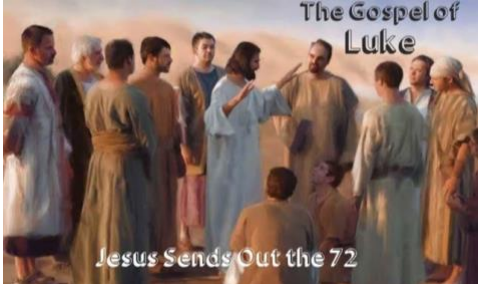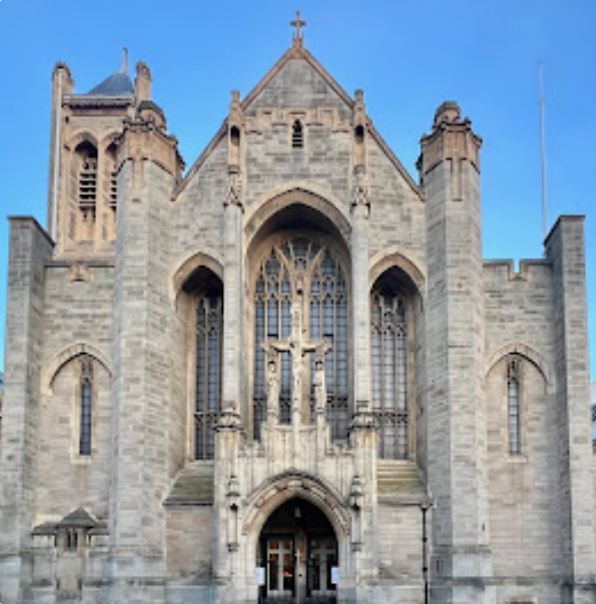Those who persevere in their reading of the letters of Paul as they are presented in the New Testament eventually arrive at three which are addressed to individuals rather than communities. These are known as the First and Second Letters to Timothy and the Letter to Titus; they are often referred to as the ‘Pastoral Letters’. In our Sunday Liturgy, we hear extracts from the two letters to Timothy as ‘second readings’ towards the end of the third year (Year C) of the lectionary cycle (Sundays 24-30 C); we listen to the letter to Titus at Midnight Mass on Christmas Day and again on Christmas morning, and both of these passages are also read on the feast of the Baptism of the Lord in Year C. We have met Timothy and Titus before in major letters of Paul; for example, Timothy was noted as Paul’s co-writer of the First letter to the Thessalonians (1 Thessalonians 1:1) and he had paid a visit to Thessalonica on Paul’s behalf (1 Thessalonians 3:1). Titus played a key role in Paul’s relationships with the Corinthians ; the apparent success of his mission there had brought Paul encouragement (2 Corinthians 7:15).
However, when we turn to the letters addressed to them, Timothy and Titus seem to have lost their character of mature partners in Paul’s missionary team. They are addressed as persons recently ordained in sore need of guidance and instruction for dealing with new pastoral responsibilities (2 Timothy 1:6) now that the first generation of missionaries, like Paul himself and other apostles who had known Jesus Christ in his earthly life, have passed on. Taken together as a whole, these three letters stress the importance of sound leadership, the need to hold on to sound doctrine and to behave appropriately in a world in which the Christians formed a small minority.
If in our reading of Paul we have noticed that his letters become shorter in length as we move forward through the New Testament, it will not surprise us if we find that the Letter to Titus reads better if we place it before the letters to Timothy. Its elaborate greeting, twice the length of those that mark the start of the letters to Timothy, may be taken as an introduction to all three Pastoral Letters (Titus 1:1-4). In this article, we will confine our attention to the passages from these letters which are read every year at Christmas and on the concluding Sundays of Year C. There will surely be time, in the six weeks during which these letters occur in our liturgy, for private reading and study of those parts of them which are not read publicly.
TITUS
Christmas [Titus 2:11-14; 3:4-7]
The passages from Titus read at Christmas provide a remarkable concentrated summary of Christian belief in language which is special to these letters. Jesus Christ is mentioned but once. He is personified as the grace of God that has appeared. This Christ is called God and Saviour. The word ‘saviour’ is rare in the New Testament as applied to Christ (examples are Luke 2:11; John 4:42) and Christ is identified with God even more rarely (a possible instance is Romans 9:5). Such language suggests that in this letter we are well advanced in the growth of the New Testament and already on the road to Chalcedon, which will recognise Christ as true God as well as true man. This Saviour has given himself for us to purify us from iniquity, to form a people for himself and is destined to return. Meanwhile we must respond to this grace of God by living lives that are godly and upright. We hear this summary of the mystery of our faith at Midnight Mass (Titus 2:11-14). On Christmas morning we have a second dense passage reflecting on God’s mercy, how in baptism we have rebirth (only here in the New Testament is baptism described as such), receive the Holy Spirit and become heirs to eternal life (Titus 3:4-7). Anyone who masters the content of these two brief Christmas readings has made good progress in understanding what it means to be a Christian. These two readings are put together to make up the second reading for the Feast of the Baptism of the Lord in Year C.
1 TIMOTHY
If we are correct in suggesting that these three letters are to be read together and are introduced by the letter to Titus, then we presume that hearers of the letters to Timothy were already familiar with the contents of Titus. So we move on to the three extracts we hear from the First Letter to Timothy.
Penitential Rite [Sunday 24 C; 1 Timothy 1:12-17]
The first offers us a sort of penitential rite. Paul describes in lively, detailed language his own sinful life. There is some tension here with what he writes in Philippians about his life before his conversion being blameless, but there he does refer to his sin of persecuting the Church of Christ (Philippians 3:6; Galatians 1:13). In this letter he identifies himself with those of his hearers who have come to Christianity from paganism. But as in every good prayer about sin, he concludes with thankfulness for the mercy which he has received and praise for the Christ who came into the world to save us from sin. The paragraph ends with elaborate praise for the king of the ages, the only God, and it is not impossible that here again, as in Titus 2:13, he is speaking of Christ as God.
Prayer [Sunday 25 C; 1 Timothy 2:1-8]
Meditations on sin and gratitude for the mercy of God in Christ that deals with it must bear fruit in prayer, and this is the topic of our second reading from Timothy. Prayer is mentioned at the beginning and end of our passage. Prayer is for everyone and is to be made in every place. The paragraph encloses what looks like a short hymn about God and Christ, one far briefer than the more familiar example we find in Philippians (2:6-11): God is one who wants all to be saved and Christ is the one who gave himself as a ransom for all – not, as in Mark’s Gospel, as ransom for many (Mark 10:45). This Christ is the ‘mediator’ between God and humankind, a word used three times in the letter to the Hebrews with reference to the priesthood of Christ (8:6; 9:16; 12:24). The point of this prayer is that we may live quiet and peaceable lives. It is presumed that there is no fierce persecution going on from state authorities, as in the book of Revelation (2:10), or from religious authorities such as in Acts when Peter has to say that we must obey God rather than human authority (Acts 5:29). It is not said that we must withdraw from the world, but we are to be a mature and edifying presence in it.
Pontius Pilate [Sunday 26 C; 1 Timothy 6:11-16]
We now jump in our Sunday readings to the final chapter of this short letter. Paul had the habit of concluding his letters with down-to-earth ethical advice, urging believers to respond in practical, active terms to the doctrine which has been the subject of previous chapters (e.g. Romans 12:1). Likewise here; we are given a list of the virtues that Christians are to pursue and value. The list might sound familiar to those who know the writings and teachings of the better Roman philosophers of the time, but it stands out in including a mention not only of Christ but of Pontius Pilate before whom Christ Jesus, ‘made his good confession’ (John 18:33). The quiet and peaceable lives which we heard about last Sunday must include the readiness to witness, and that witness might well be before a hostile audience. We note also more titles for Christ; he is King of kings and Lord of lords, titles somewhat risky in an age when they were claimed by the emperor in Rome, whose predecessor, Nero, had condemned many to death including Peter and Paul.
2 TIMOTHY
The atmosphere becomes more personal when we turn to the Second Letter to Timothy. Individuals are named and the author gives details of his personal situation. The letter has been described as Paul’s last will and testament, a longer version of his farewell speech in Acts to the elders of the church at Ephesus (Acts 20:18-25). Four extracts from it are chosen for public reading in this year C.
Mother and Grandmother [Sunday 27 C; 2 Timothy 1:6-8, 13-14]
The first passage concentrates on the person and background of Timothy. In the verse before our reading begins (1:5), we learn about his mother, Eunice, and his grandmother, Lois. Their sound piety was to be a model for his. The Paul who writes the Pastoral letters contrasts with the Paul who roamed the frontiers of theology in Galatians when he justified his missionary methods to Peter (Galatians 2:16) and in Corinthians when he defended his apostleship before those who denied him the title (1 Corinthians 9:1). Here, he is one who passes on sound tradition. His teaching was what Timothy’s grandmother held, and went back to Christ Jesus; it concerned faith and love, and one cannot be more orthodox than that. Our readings omit passages from these letters which speak in fierce terms of the errors of those who tried to push theology forward in unacceptable ways. By laying his hands on Timothy, Paul passed on the traditional faith which he knew and taught, and he expected Timothy to do the same.
(Some of the verses that are omitted in this paragraph are used in the lectionary on the second Sunday of Lent in Year A: they contain the word ‘appearance’, the same word applied to Christ in our Christmas reading from Titus. The passage is chosen to accompany the Transfigured appearance of Christ in the gospel of that day. [ 2 Timothy 8b-10 ])
The Faithful Christ [Sunday 28 C; 2 Timothy 2:8-13]
In his major letters, Paul never tired of mentioning Jesus Christ (Galatians 2:20). Our second extract from this letter begins with a reference to Jesus Christ ‘raised from the dead’, but Paul has much more about himself than about Christ. He is in chains. The great prison letter of Paul is that addressed to the Philippians; there he prays with joy (Philippians 1:3). Here however, as elsewhere in this letter, Paul speaks of his suffering (2 Timothy 3:11). The positive side of the passage is his linking of his suffering and endurance, and indeed that which his readers shared, with Christ, because, as he concludes in what appears to be another Christian hymn, even ‘if we are faithless, Christ remains faithful’; if it were otherwise, he would not be true to himself. Thanks to Christ, we will have life and kingship.
Do This, Do That [Sunday 29 C; 2 Timothy 3:14-4:2]
Paul often turned to the imperative mood in the final parts of his letters when writing to communities. (A good example is found in 1 Thessalonians 5:13-22). Here he addresses Timothy in the singular and directly with a barrage of orders. Again we are to recognise Timothy as a representative figure rather than the person who had acted as Paul’s diplomatic agent in difficult missionary situations in years past. This language models what Timothy himself is to use as he prepares a new generation of teachers and church leaders. Some of these directives are familiar: he is to continue what he learned as a child; he is to convince, rebuke and encourage, with utmost patience in his proclamation of the message. But of more permanent interest are Paul’s remarks on scripture, which are often combined with other New Testament texts in upholding its value and importance as being inspired by God and its use for teaching, reproof, correction and training in righteousness (Romans 15:4; 2 Peter 1:19-21). This text is quoted in Vatican II’s Dogmatic Constitution on Revelation ( Dei Verbum 4, 11). It is curious that in the Pastoral Letters, in contrast to Paul’s major letters (e.g. Romans 3:10-18), it is difficult to find references to the Hebrew Scriptures, which is what Paul meant here by scripture.
The Good Fight [Sunday 30 C ; 2 Timothy 4:6-8, 16-18]
It is fitting that our final passage concentrates on the figure of Paul himself. Many of those who have difficulties in identifying the Paul in the title of these letters with the Paul who wrote his so-called undisputed letters, suggest that here at least we have a fragment of the Paul we recognise there. But even here, the language differs from that which Paul uses in his major letters. He has fought the good fight. He has kept the faith, just as he has been urging Timothy to do. He speaks of Christ as the Lord. Even if others deserted him, the Lord stood by him, as we hear him doing at Corinth in the Acts (19:9-10). The Lord is not one who condemns but one who rescues, and to him, as to God, there is to be glory forever.
As Year C of the lectionary approaches its end, it invites us over a period of six weeks to visit and savour this less dramatic and indeed obscure section of the New Testament which long ago helped Christians overcome crisis, a crisis that may well have arisen because they could no longer rely on the direction and guidance of those who had brought them the Christian message. It is to be hoped that our reading of these liturgical texts will stimulate us to read the complete letters for ourselves so that we can view them in their original contexts. Our prayer is that, through these Pastoral Letters and in company with their original recipients, we will raise the quality of our response to the gospel and learn how to cope better with the crises we meet as individuals and as members of ‘the church of the living God’, which our author describes as ‘the pillar and bulwark of the truth’ (1 Timothy 3:15).
Peter Edmonds SJ is a member of the Jesuit community at Stamford Hill, North London.











